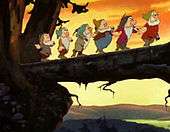Definify.com
Webster 1913 Edition
Dwarf
Dwarf
,Noun.
pl.
Dwarfs
(#)
. [OE.
dwergh
, dwerf
, dwarf
, AS. dweorg
, dweorh
; akin to D. dwerg
, MHG. twerc
, G. zwerg
, Icel. dvergr
, Sw. & Dan. dverg
; of unknown origin.] 1.
An animal or plant which is much below the ordinary size of its species or kind.
☞ During the Middle Ages dwarfs as well as fools shared the favor of courts and the nobility.
Dwarf is used adjectively in reference to anything much below the usual or normal size; as, a
dwarf
pear tree; dwarf
honeysuckle. Dwarf elder
(Bot.)
, danewort.
– Dwarf wall
(Arch.)
, a low wall, not as high as the story of a building, often used as a garden wall or fence.
Gwilt.
Dwarf
,Verb.
T.
[
imp. & p. p.
Dwarfed
; p. pr. & vb. n.
Dwarfing
.] To hinder from growing to the natural size; to make or keep small; to stunt.
Addison.
Even the most common moral ideas and affections . . . would be stunted and
dwarfed
, if cut off from a spiritual background. J. C. Shairp.
Dwarf
,Verb.
I.
To become small; to diminish in size.
Strange power of the world that, the moment we enter it, our great conceptions
dwarf
. Beaconsfield.
Webster 1828 Edition
Dwarf
DWARF
,Noun.
1.
A general name for an animal or plant which is much below the ordinary size of the species or kind. A man that never grows beyond two or three feet in highth, is a dwarf. This word when used alone usually refers to the human species, but sometimes to other animals. When it is applied to plants, it is more generally used in composition; as a dwarf-tree; dwarf-elder.2.
An attendant on a lady or knight in romances.DWARF
,Verb.
T.
Definition 2026
dwarf
dwarf
English
Noun
dwarf (plural dwarfs or dwarves)
- (mythology) Any member of a race of beings from (especially Scandinavian and other Germanic) folklore, usually depicted as having some sort of supernatural powers and being skilled in crafting and metalworking, often depicted as short, and sometimes depicted as clashing with elves.
- (now often offensive) A person of short stature, often one whose limbs are disproportionately small in relation to the body as compared with normal adults, usually as the result of a genetic condition.
- An animal, plant or other thing much smaller than the usual of its sort.
- dwarf tree; dwarf honeysuckle
- (astronomy) A star of relatively small size.
Usage notes
At first, dwarfs was the more common plural in English. After J. R. R. Tolkien used dwarves, it began to rise in popularity, and is now about as common as dwarfs.
Synonyms
Antonyms
Derived terms
term derived from dwarf
Translations
being from folklore, underground dwelling nature spirit
|
|
small person
|
|
something much smaller than the usual of its sort
astronomy: relatively small star
Adjective
dwarf (not comparable)
- (especially in botany) Miniature.
- The specimen is a very dwarf form of the plant.
- It is possible to grow the plants as dwarf as one desires.
Translations
miniature
Verb
dwarf (third-person singular simple present dwarfs, present participle dwarfing, simple past and past participle dwarfed)
- (transitive) To render (much) smaller, turn into a dwarf (version).
- (transitive) To make appear (much) smaller, puny, tiny.
- 2013 May-June, Kevin Heng, “Why Does Nature Form Exoplanets Easily?”, in American Scientist, volume 101, number 3, page 184:
- In the past two years, NASA’s Kepler Space Telescope has located nearly 3,000 exoplanet candidates ranging from sub-Earth-sized minions to gas giants that dwarf our own Jupiter.
- The newly-built skyscraper dwarfs all older buildings in the downtown skyline.
-
- (transitive) To make appear insignificant.
- Bach dwarfs all other composers.
- (intransitive) To become (much) smaller.
- To hinder from growing to the natural size; to make or keep small; to stunt.
- (Can we find and add a quotation of Addison to this entry?)
- J. C. Shairp
- Even the most common moral ideas and affections […] would be stunted and dwarfed, if cut off from a spiritual background.
Synonyms
- (make much smaller) miniaturize, shrink
- (become much smaller) shrink
Translations
to render smaller, turn into a dwarf
to make appear much smaller
|
to make appear insignificant
|
to become (much) smaller
|
to make or keep small
|

